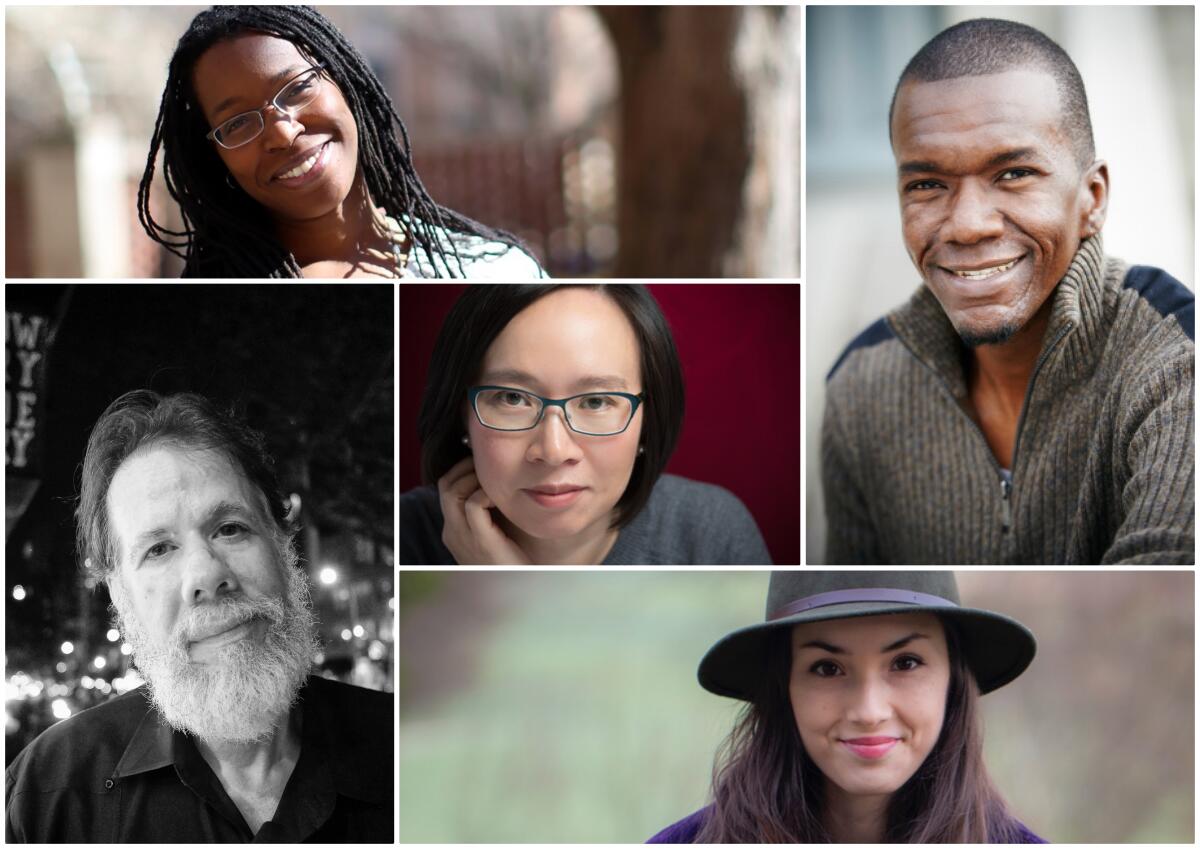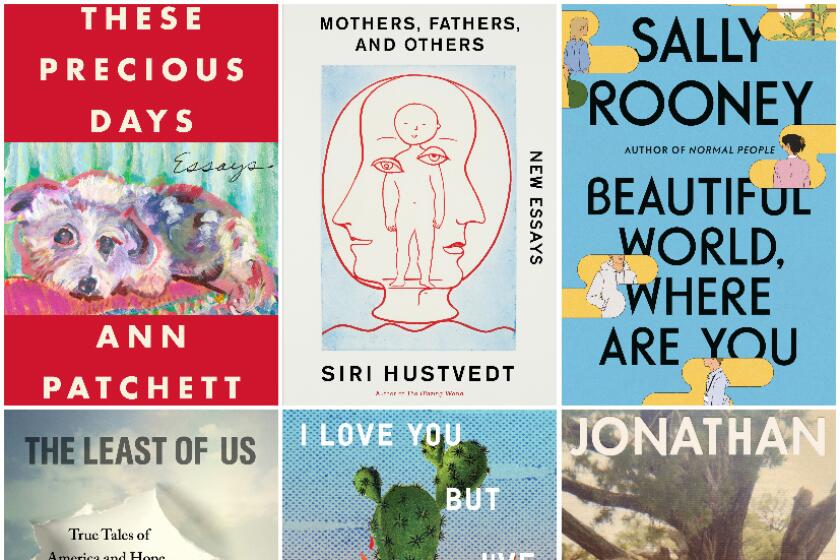Jason Mott, Tiya Miles among the winners of the 2021 National Book Awards

- Share via
Jason Mott won the fiction prize for his novel “Hell of a Book” at the 2021 virtual National Book Awards Wednesday night, hosted inside the offices of Penguin Random House.
“Hell of a Book” opens as the story of a Black author touring the country to promote his novel, but it soon broadens to take on themes of love, family and what it means to be Black in America. The National Book Award Foundation called it a “masterful novel” and praised Mott for managing “the impossible trick of being playful, insightful and deeply moving all at the same time.”
Prepared with a pre-written speech, an overwhelmed Mott dedicated the prize to “the mad kids. To all the outsiders, the weirdos, the bullied, the ones so strange that had no choice but to be misunderstood by the world and those around them.
“The ones who, in spite of this, refused to outgrow their imagination, refused to abandon their dreams, refused to deny, diminish their identity, or their truth or their loves, unlike too many others,” he continued.
The 72nd National Book Awards, one of the country’s most prestigious literary prizes, was hosted by comedian, actress and New York Times bestselling writer Phoebe Robinson. The author of three books, most recently “Please Don’t Sit on My Bed in Your Outside Clothes,” Robinson is the founder of Tiny Reparations Books, an imprint dedicated to highlighting diverse voices.
Tiya Miles was awarded the nonfiction prize for “All That She Carried: The Journey of Ashley’s Sack, A Black Family Keepsake,” deemed by judges a “brilliant, original work” with “graceful prose.” Beginning in the 1850s in South Carolina, the book follows the journey of a cotton sack across several generations of women.
After thanking a professor and others, Miles expressed deep gratitude to her agent, Tanya McKinnon, and editor, Molly Turbin.
“Molly, I remember your face when we were having coffee and meeting for the first time and you asked about my projects and I said that I wanted to write a book about an old bag, because your face lit up,” she said. “You were so curious. You were so receptive. You were the perfect editor for this project, and you and I both know this was a co-written book.”
In poetry, Martín Espada won for his collection “Floaters,” which celebrates rebels and dreamers and condemns the poor governmental response to Hurricane Maria in 2017 in Puerto Rico, where his father is from. “These poems remind us of the power of observation, of seeing everything,” all of it “worthy of song,” the judges said.
Espada thanked — among others — his late father, “who provided both an artistic and ethical example to me throughout my life.”
And to his fellow finalists, he added: “I know what it’s like to be where I am and I know what it’s like to be where you are, and I hope that we can form friendships independently of the National Book Awards.”
Sally Rooney, Anthony Doerr, Maggie Nelson, Richard Powers, Jonathan Franzen — the list goes on. Four critics on kicking off a big, bookish fall.
The award in the category of translated literature went to Elisa Shua Dusapin for “Winter in Sokcho,” translated from French by Aneesa Abbas Higgins. Described as a “tender and mysterious novel” by the judges, it follows an uneasy relationship between a French Korean receptionist and a French cartoonist who lands at the guesthouse she works in.
“This is incredible for me,” said a dumbfounded Shua Dusapin before finishing her speech in French. “This is a book that has come much from her heart,” said Abbas Higgins, translating for the author. “These are things that are very, very dear to her.”
The young people’s literature award went to Malinda Lo for “Last Night at the Telegraph Club,” which judges called an “incandescent novel of queer possibility.” The narrative, set in 1954, follows two young women who risk everything to bring their love out of the shadows.
Conservative parents in Texas and around the country rally to expunge certain titles from school libraries for reasons of race and sex.
In her acceptance speech, Lo noted the expansion of LGBTQ YA books published in the past 12 years since the release of her first book “Ash,” but added, “The opposition to our stories has also grown,” referring to proliferating calls to remove certain books from schools.
“This year, schools across the country are facing significant right-wing pressure to remove books about people of color, LGBTQ people and especially transgender people from classrooms and libraries,” she said. “I urge every one of you watching to educate yourselves about your school boards and vote in your local elections. 2022 is coming and we need your support to keep our stories on the shelves. Don’t let them erase us.”
Amplifying the message that libraries remain essential to the culture, the National Book Foundation awarded its Literarian Award for Outstanding Service to the American Literary Community to Nancy Pearl, a beloved Seattle-based librarian who is also a bestselling author.
The Medal for Distinguished Contribution to American letters went to Karen Tei Yamashita. A former National Book Award finalist and author of eight books and numerous plays, Yamashita teaches literature and creative writing at UC Santa Cruz.
“Asian American literature is at heart a literature of politics and resistance,” she said in her speech. “For our community, your recognition tonight is significant, especially this year, post-pandemic, having weathered the twitter of absurdity, corruption and mendacity. The brutality of racial profiling and the provocation of anti-immigrant, anti-refugee, anti-Muslim, anti-Asian hatred.
“In such times, may our writing forge tolerance and care.”
Here is the complete list of the 2021 National Book Award finalists announced in October:
Young people’s literature
- Shing Yin Khor, “The Legend of Auntie Po”
- Malinda Lo, “Last Night at the Telegraph Club”
- Kyle Lukoff, “Too Bright to See”
- Kekla Magoon, “Revolution in Our Time: The Black Panther Party’s Promise to the People”
- Amber McBride, “Me (Moth)”
Translated literature
- Elisa Shua Dusapin, “Winter in Sokcho,” translated from French by Aneesa Abbas Higgins
- Ge Fei, “Peach Blossom Paradise,” translated from Chinese by Canaan Morse
- Nona Fernández, “The Twilight Zone,” translated from Spanish by Natasha Wimmer
- Benjamín Labatut, “When We Cease to Understand the World,” translated from Spanish by Adrian Nathan West
- Samar Yazbek, “Planet of Clay,” translated from Arabic by Leri Price
Poetry
- Desiree C. Bailey, “What Noise Against the Cane”
- Martín Espada, “Floaters”
- Douglas Kearney, “Sho”
- Hoa Nguyen, “A Thousand Times You Lose Your Treasure”
- Jackie Wang, “The Sunflower Cast a Spell to Save Us From the Void”
Nonfiction
- Hanif Abdurraqib, “A Little Devil in America: Notes in Praise of Black Performance”
- Lucas Bessire, “Running Out: In Search of Water on the High Plains”
- Grace M. Cho, “Tastes Like War: A Memoir”
- Nicole Eustace, “Covered With Night: A Story of Murder and Indigenous Justice in Early America”
- Tiya Miles, “All That She Carried: The Journey of Ashley’s Sack, a Black Family Keepsake”
Fiction
- Anthony Doerr, “Cloud Cuckoo Land”
- Lauren Groff, “Matrix”
- Laird Hunt, “Zorrie”
- Robert Jones Jr., “The Prophets”
- Jason Mott, “Hell of a Book”
Announced on Tuesday, the 2021 National Book Awards finalists include Lauren Groff, Anthony Doerr and Hanif Abdurraqib.
More to Read
Sign up for our Book Club newsletter
Get the latest news, events and more from the Los Angeles Times Book Club, and help us get L.A. reading and talking.
You may occasionally receive promotional content from the Los Angeles Times.












